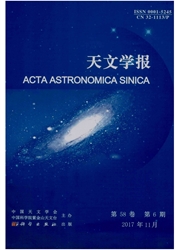

 中文摘要:
中文摘要:
以氢钟作为主钟系统的频率源,可产生短期稳定度更好的本地时间UTC(k),氢钟通常具有频率漂移效应,这使得氢原子钟的长期稳定度随着时间的推移不断降低,进而影响UTC(k)的稳定度与准确度.为解决这一问题,比较分析了氢钟和铯钟的性能,改进了氢钟参与时间尺度计算的算法,并提出了基于主钟为氢钟的频率驾驭算法.通过搭建试验系统,编制相关的软件,对该算法进行了检验.测试结果表明当氢钟参与原子时计算时,可有效改善参考时间尺度的短期稳定度,同时主钟频率源为氢钟比主钟频率源为铯钟产生的本地时间UTC(k)具有更好的短期频率稳定度.
 英文摘要:
英文摘要:
In the master clock system, the local standard time UTC(k) with a better short-term stability will be generated, if the hydrogen maser is set as a frequency source of the master clock. But the hydrogen maser always exhibits an apparent frequency drift, thus its long-term stability gets poor with time, therefore the stability and accuracy of UTC(k) become worse. To solve this problem, we compare the performance of hydrogen maser with cesium clocks, and modify the time scale algorithm when the hydrogen maser is involved, we also propose a new steering strategy when hydrogen maser is used as the frequency source of master clock. We set up an experiment system and write programs, and finally the new steering strategy is testified with the laboratory data. Results show that when the hydrogen maser is involved in the atomic time scale calculation, the short-term frequency stability of reference time scale will be improved. Meanwhile, the local time UTC(k) has a better short-term frequency stability when the frequency source of the master clock uses hydrogen maser instead of cesium clock.
 同期刊论文项目
同期刊论文项目
 同项目期刊论文
同项目期刊论文
 期刊信息
期刊信息
